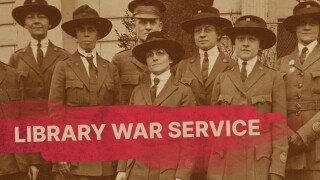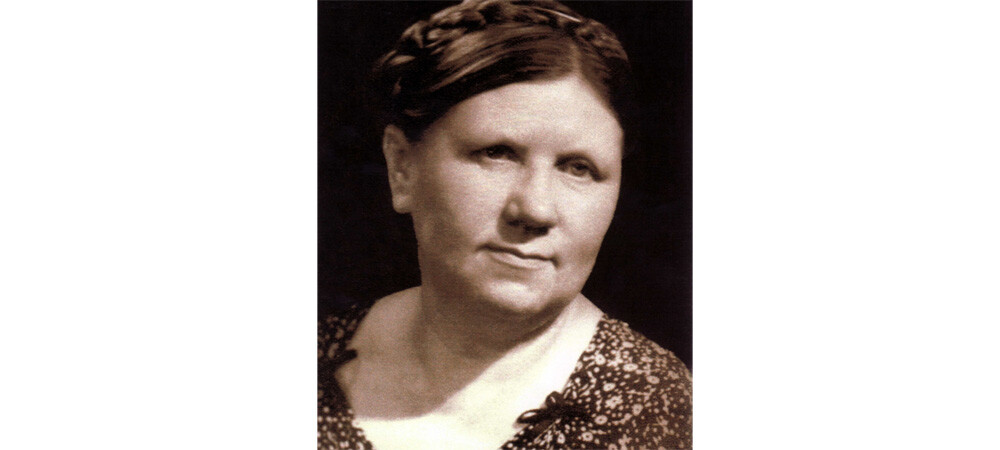5 Ways Libraries Used to Be Hardcore

While every profession employs miserable people doing jobs just because they’re told to, librarians are an exception. Librarians are heroes. Librarians — and firefighters. Firefighters are heroes, too. It’s no coincidence, then, that these two occupations are so well represented in porn.
Libraries aren’t just sanctums of knowledge and places where you can furtively watch porn (about librarians). In the past, stuff there got pretty intense. For example...
Libraries Sterilized or Even Incinerated Books, and Laws Kept the Sick From Borrowing
Don't Miss
The rise of public libraries in the 19th century raised a troubling possibility: What if trading books was gross? You were touching all these items that other people had fondled, people whose hygiene and morals you had no way to evaluate. We don’t have many public shoe exchanges, or rent-a-bra companies, because despite the obvious advantages of such facilities, such ideas repulse people. Maybe we should be just as weirded out by borrowing books.

Fuel for these fears came from a scientist named William R. Reinick, writing in the American Journal of Pharmacy. Someone once caught smallpox from a book, he said. Someone caught gonorrhea from a book, he claimed (exactly what they’d been doing to the book, he did not say). You could even catch cancer from books, he asserted. Then he shared the results of an experiment, where he kept 40 guinea pigs and gave them library book paper as bedding. All the guinea pigs died. This was damning evidence, if you don’t know much about how experiments are supposed to have control groups.
Britain amended their public health laws to ban sick people from touching library books. In 1910s America, the mob pressured librarians into sterilizing books. This was no easy task, as books don’t respond very well to either cleansing fire or boiling water. Libraries used steam sometimes, and other times bathed books in solutions that should kill germs without dissolving paper. Massachusetts, always up for some puritan panicking, recommended burning any books suspected of infection, and other states followed suits.

Today, we’re a bit cleaner than people were a century ago. So were those book bleachers ahead of their time? Heck no. Some health measures make sense, while others do not. Examining books tells us that, yeah, they might have some germs on them, but still, it seems no one ever gets sick from handling books. Except for those people who say, “That author’s my jam, inject that stuff right into my veins.” They need to learn that that’s not the optimal way to absorb a book; you can take in a page simply by looking at it.
During the Depression, Librarians Went Out on Horseback to Bring Books to Mountain Folk
While some people mistrusted libraries because of the threat of STIs (scholastically transmitted infections), plenty of others had no access to libraries at all. Then came the Great Depression, and along with various other jobs, the Works Progress Administration dispatched librarians into rural Appalachia. These were places disconnected from cities, without even any roads connecting them, and librarians were arriving to bring them books — on horseback.

Kentucky Digital Library
Some might question whether books should have been the highest priority, since a third of the people these librarians were servicing couldn’t read. But this program was going to last a decade, and you know what’s a good way of convincing people to learn to read? Seeing a bunch of other people around them reading the books they just received on horseback.
These mounted quests weren’t easy. Sometimes, the horse (or mule) would keel over and die. The librarian would have to continue the remaining many miles on foot. Sometimes, locals didn’t take kindly to these strange women bearing written words, forced on them by the government. Thankfully, the librarians had a solution for worming their way into such people’s hearts: the Bible. A lot of these residents had heard Bible stories but had never had their hands on the entire book, and if a pack-horse librarian could offer them access to that, well, maybe they weren’t so bad after all.

“Oh yeah, we have the hot parts of the Bible too, no problem!”
The horses reached hundreds of schools and tens of thousands of families. The program ended in the 1940s when the U.S. entered World War II, but by this point, roads had snaked their way through a lot more of these mountains, and so the people there received a new kind of traveling library: bookmobiles.
Librarians Put on Uniforms and Went to War (as Librarians)
Soldiers during wartime needed books, just as much as anyone ever needs them. Library associations put together 10 million books to send to the troops during World War I, and close to double that for World War II. This didn’t take a chunk out of the military’s bullet-and-boots budget either, as librarians and their benefactors raised the funds for the collections themselves.
But who in the military was qualified to oversee these dozens of camp libraries? No one, that’s who. They needed outside help from librarians. Thus, the American Library Association formed a Library War Service, outfitting its personnel in uniforms and shipping them overseas.

These librarians didn’t take part in any combat, as far as we know, so they were able to stay safe. Some other individual librarians, however, chose danger. In Vilnius, Lithuania, the Nazis set up a Jewish ghetto and banned anyone from entering or leaving. Librarian Ona Šimaitė managed to go in and out anyway, using the excuse that she was collecting overdue library books. During these trips, she smuggled in food and arms, and smuggled out documents for preservation. She also smuggled out children, in sacks.

It went well until April 28, 1944, when the Gestapo got her. They interrogated her, tying her upside down and burning the soles of her feet with hot irons, but it was in vain, because librarians are experts at maintaining silence. She narrowly escaped execution, survived the war and ended up settling in Paris.
Pretty amazing that she managed to keep her ruse going for as long as she did. In real life, no one takes overdue library books that seriously, right?
Police Arrested People in the Middle of the Night Out of Their Beds for Overdue Books
It’s possible to get arrested for overdue library books, even today. Laws on the books let it happen in states like Iowa and Texas. In 2013, for example, headlines noted that police arrested a man for holding on to his GED guide for three years longer than he was supposed to. But the cops didn’t stop by his place just for that. They were there responding to an unrelated disturbance, and they let the guy go soon thereafter. Then, a year later, his girlfriend who lived with him stabbed him to death, and she got a 15-year sentence, so maybe authorities could have done a better job responding to that disturbance, now that we think about it.

Copperas Cove Police Department
Go back a few years, though, and enforcement hit harder. Take New Jersey in 1961. Harold Roth, the director of the East Orange Public Library, decided he was through waiting on people to return their late books, and so, he called in the police. The cops staged midnight raids on 14 homes. People who had cash on them to pay the fines did so, while others had to go right to jail.
Pretty much everyone thought this was nuts. Later that week, someone prank called the police department, saying, “Lieutenant, get a lot of patrol cars over to Main and Arlington, quick. Something terrible has just happened there. A car just ran over a book.” Police had no means of tracing that call, else the caller would later surely also have been found stabbed to death. “I’m surprised at all the fuss that’s been stirred up,” said Roth, facing complaints. “I just wanted the books returned.”

It had been “an expensive way to collect books, for both the city and the people,” Roth would later say, and a few years later still, he’d say that this did not lead to any long-term changes in how deeply borrowers respect due dates. Today, libraries find that abolishing fines is actually the more effective tactic at getting tardy patrons to bring their books back.
J.P. Morgan Locked the Nation’s Financiers in a Library Till They Agreed to Bail the Country Out
In 1907, the economy was in real trouble. The stock market fell by half. Banks went bust. Businesses closed. The U.S. Treasury couldn’t help much because they were pretty much out of money as well. The Federal Reserve couldn’t inject a bunch of money into the system because the Federal Reserve didn’t exist yet. Instead, the burden for saving the country fell on J.P. Morgan. J.P. Morgan, librarian.
Okay, he’s more properly summed up as J.P. Morgan, banker. But he also had a vast collection of books, which grew larger than his house could hold, so he bought a bunch more plots of land and built the Morgan Library. He made it a public institution in his will. Before that, on November 2, 1907, he locked 100 bankers in there all night.

Detroit Publishing Company
This was not, according to most sources, a plan to kill all his rivals and leave him the only man standing. He was here to avert one more crisis on top of the ongoing crisis. Two trust companies (for convenience, think of them as megabanks), had announced they wouldn’t be opening on Monday, which would send a whole other set of dominoes tumbling. Morgan told the bankers that if they came up with $25 million to lend the trusts, the country would survive, for at least 115 years more.
The men talked for a while, then got up to leave, but they discovered they couldn’t open the meeting room’s bronze doors. Yeah, we weren’t using the phrase “locked in” figuratively just now — Morgan had actually turned the key and locked it. He left the group stewing in their cigar smoke for hours, before coming in with a sheet of paper. Sign it, he told Edward King, president of the New York Stock Exchange. King did sign it, and the others there signed it, too.

Pach Brothers
With a healthy buffer of money backing them up, the trusts opened on Monday. The first people who wanted to withdraw their money were able to, and other people who feared the worst realized they could leave their money in the banks for a while longer.
The country survived, as did the library. Visit it today, to see some books, or to see a third-century Roman sarcophagus that Morgan installed. You can ask why he installed a sarcophagus there, but the last person who asked that is now sealed away, within the sarcophagus.
Follow Ryan Menezes on Twitter for more stuff no one should see.